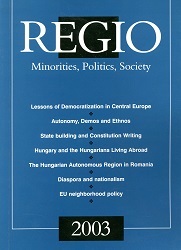State Building and Constitution Writing in Central and Eastern Europe after 1989
State Building and Constitution Writing in Central and Eastern Europe after 1989
Author(s): Irina CulicSubject(s): Politics / Political Sciences
Published by: MTA Társadalomtudományi Kutatóközpont Kisebbsegkutató Intézet
Keywords: constitution; state building; nation
Summary/Abstract: Most countries of the former communist bloc wrote a new constitution as a result of major changes in 1989 and 1991. The revolutions that led to the dismantling of the communist system were seen as more than the termination of an illegitimate, violent, repressing, and economically bankrupt regime. For the newly independent states they were also liberating movements, as they were for the satellite states as well. Moreover, this liberation was seen as the final episode of a century long struggle for national self-determination, statehood and independence. Thus post-communist state-building took place within a modern framework of statehood and international relations, according to the modern principles of territoriality and sovereignty. Moreover, new states were set as states of and for a nation, and thus state building was conceived as vigorous nation building. Constitutions and citizenship policies – which have a constitutive worth as acts whereby the body politic of the state is set and which are expressive of the nature of the state, followed the national principle. All related legislation was shaped according to remedial and assertive nationalism.
Journal: Regio - Minorities, Politics, Society - English Edition
- Issue Year: VI/2003
- Issue No: 1
- Page Range: 38-58
- Page Count: 21
- Language: English

